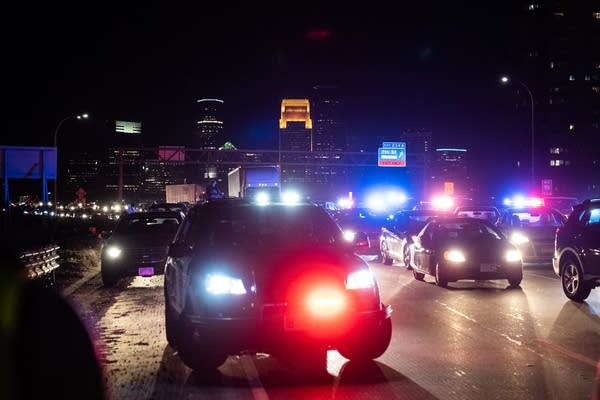Under court review: Deadly force law that passed after Floyd's killing

Go Deeper.
Create an account or log in to save stories.
Like this?
Thanks for liking this story! We have added it to a list of your favorite stories.
A Minnesota judge said Monday he will decide soon whether to suspend a new police deadly force law or dismiss a challenge to the stricter standard the Legislature passed after George Floyd’s killing in Minneapolis.
The lawsuit is the first major test to policing changes approved after Floyd’s 2020 death in Minneapolis police custody. Ramsey County District Court Judge Leonardo Castro heard more than 70 minutes of arguments over the way the law was crafted and whether officers had enough time to adapt to the requirements.
In promising a quick turnaround, Castro said he recognizes “the importance of this. The last thing I want to do is leave our law enforcement personnel in limbo as to how they need to move forward.”
Several police groups want the law tossed out or at least suspended until more officers can be trained on the revised expectations.
Turn Up Your Support
MPR News helps you turn down the noise and build shared understanding. Turn up your support for this public resource and keep trusted journalism accessible to all.
“We’re now asking officers to evaluate use-of-force incidents or critical incidents in a manner that is completely different than what they were trained to do prior to March 1 of this year,” attorney Mark Schneider, who spoke on behalf of rank-and-file officers, police chiefs and sheriffs in the hearing.
The change was among a series of laws adopted in July 2020 in response to the attempted arrest that left Floyd dead and sparked worldwide protest over racial inequality. Certain chokeholds and restraints are now barred, and fellow officers face new requirements to step in if a colleague mistreats someone.
The deadly force law raised the bar on officers to justify in specific terms their actions involving lethal force were necessary. Previously, a legitimate defense in a criminal case was that force was used to defuse an apparent threat and could be based on how an objective officer could reasonably view the incident.
The police groups tried to secure a delay from the Legislature but didn’t prevail. So in early July, they sued.
In the court hearing, Schneider argued that the law creates an expectation that officers presenting a defense to charges in critical incidents are compelled to clearly articulate what threat they saw, what they were thinking and what steps they took. That, he contends, denies officers the chance to say nothing at all and violates their constitutional protection against self-incrimination.
“This statute as written is requiring me to take the stand in order for me to take advantage of the affirmative defense and articulate with specificity why I took the action I did under those split-second circumstances,” Schneider said.
He said it could cause officers to freeze on duty as they go through the calculations about how they’ll defend an action later. And if they don’t give statements to investigators, Schneider said it could make charges more likely or let public perception of wrongdoing set in.
Castro said several times in the hearing that he was struggling with the proposed remedy, which he said could leave a void of any standard.
“What can peace officers then rely upon because I’m convinced sir that I cannot reinstate an old statute?” Castro asked the police attorneys.
And he pressed Schneider on why the new criteria aren't on par with the kind of reports officers file after public interactions all the time.
“So on a daily basis, they’re making statements on what they did and why they did it,” Castro said. “I’m having trouble understanding how this is any different than that.”
Attorneys for the defendants in the case — Gov. Tim Walz and the state of Minnesota — presented arguments against an injunction and for outright dismissal of the case.
They noted that there haven’t been any cases yet where it has been an issue.
“Plaintiffs have cited no one who is facing criminal charges and who intends to assert this affirmative defense,” Assistant Attorney General Anna Veit-Carter said. “So the constitutionality question is simply not ripe at this time.”
Her colleague, Assistant Attorney General Leah Tabbert, said the place to address the law in the Legislature — not the courts.
“Because there was such a public outcry and a public reckoning that led to these changes to the use-of-force statute, I would submit there is no way it’s in the public interest to enjoin those changes and to override the will of the people as translated by the Legislature,” Tabbert said.
Castro said the police organizations might have a legal footing because the law applies strictly to law enforcement.
“It applies to a certain group of our society, unlike most other statutes that generally would apply to everyone,” Castro said. “If it only applies to certain groups it can be anticipated that it would be applied to them.”


